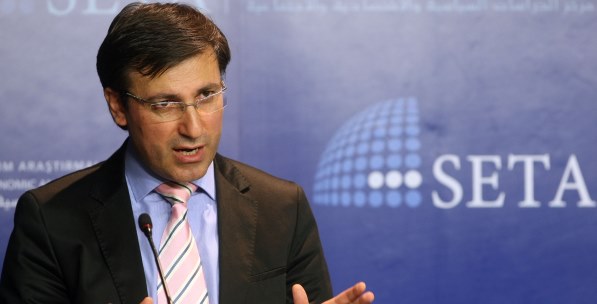We interviewed Insight Turkey Editor-in-chief Professor Talip Küçükcan on the accomplishments and the new editorial team of Insight Turkey and for his future projections of the journal. A peer-reviewed quarterly published by SETA Foundation, Insight Turkey has published its “Autumn 2013” issue with its new editorial team.
First of all, what do you think about Insight Turkey?
Insight Turkey is a journal which makes efforts to understand the region and the world in the eyes of both Turkey and the region. Insight Turkey attempts to announce to the world the developments in our region by speaking a local accent as much as possible but by looking from a global perspective. Insight Turkey strives to analyze the great change that Turkey has been undergoing both as a country alone and with its neighbors. In this sense, Insight Turkey mainly differs from other journals as it speaks a local language to universal readers. Besides, a great majority of the articles on Turkey and the Middle East or articles related to Turkey were Eurocentric articles which largely ignored internal dynamics of the region. Insight Turkey started a good tradition in this sense and diversified authors. Insight Turkey covers the articles of a wide range of writers notably from Turkey, the Arab world, Iran, Russia, Balkans; and, in wider sense, Europe and the US. Therefore, it does not include authors only from a particular region. From this aspect, Insight Turkey is an interdisciplinary journal.
How would you describe the content and the readers of the journal?
Insight Turkey deals with a variety of disciplines such as political science, sociology, economy, international relations. It does not analyze an issue only from a single perspective but from different perspectives. In this sense, it appeals to different groups; in other words, Insight Turkey on the one hand appeals to decision makers while it attracts academics, think-tanks, intellectuals, postgraduate students and diplomats on the other. It is a quarter that analyzes the geography where Turkey is located and makes predictions about the future by carrying out knowledge-based and data-based analyses while remaining impartial. All journals, of course, go through some certain phases. This is also the case for Insight Turkey.
WE ARE TRYING TO STAY UP TO DATE WITHOUT BEING CONFINED TO THE AGENDA
What kinds of steps Insight Turkey has undergone?
Insight Turkey was born; it grew up and developed. Now it is in a good position. Previous editors and other members of the Insight Turkey team made great contributions. Of course, in every institution there are reassignments or change of duty, some people quit and others take over the responsibility. As predecessors are tired, they pass the torch to successors. This was the case. Those working for Insight Turkey before us elevated the journal into a good position and made a great deal of contributions to the international recognition of the journal. İhsan Dağı served as the editor-in-chief for five years, but preferred to take a rest. As a new team, we have taken over the responsibility and I have become the new editor-in-chief of Insight Turkey. We have two Book Review editors. It is a young team. We will follow global developments, stay up to date yet avoid only focusing on the current agenda and will endeavor to find an answer to what we can tell about the future by paying attention to historical experience and depth as well. In this sense, we are trying to create a large pool of writers.
How do you decide authors and topic?
Our pool of writers will include not only academics but also decision-makers, those who have experience in politics, journalists and intellectuals. In this sense, the content of Insight Turkey will be enriched. When it comes to topic, I can say that Insight Turkey will cover a variety of topics. We will also concentrate on special topics in special issues. For instance, our la



